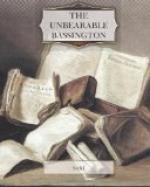The curtain came down on the first act amid an encouraging instalment of applause, and the audience turned its back on the stage and began to take a renewed interest in itself. The authoress of “The Woman who wished it was Wednesday” had swept like a convalescent whirlwind, subdued but potentially tempestuous, into Lady Caroline’s box.
“I’ve just trodden with all my weight on the foot of an eminent publisher as I was leaving my seat,” she cried, with a peal of delighted laughter. “He was such a dear about it; I said I hoped I hadn’t hurt him, and he said, ’I suppose you think, who drives hard bargains should himself be hard.’ Wasn’t it pet-lamb of him?”
“I’ve never trodden on a pet lamb,” said Lady Caroline, “so I’ve no idea what its behaviour would be under the circumstances.”
“Tell me,” said the authoress, coming to the front of the box, the better to survey the house, and perhaps also with a charitable desire to make things easy for those who might pardonably wish to survey her, “tell me, please, where is the girl sitting whom Courtenay Youghal is engaged to?”
Elaine was pointed out to her, sitting in the fourth row of the stalls, on the opposite side of the house to where Comus had his seat. Once during the interval she had turned to give him a friendly nod of recognition as he stood in one of the side gangways, but he was absorbed at the moment in looking at himself in the glass panel. The grave brown eyes and the mocking green-grey ones had looked their last into each other’s depths.
For Comus this first-night performance, with its brilliant gathering of spectators, its groups and coteries of lively talkers, even its counterfoil of dull chatterers, its pervading atmosphere of stage and social movement, and its intruding undercurrent of political flutter, all this composed a tragedy in which he was the chief character. It was the life he knew and loved and basked in, and it was the life he was leaving. It would go on reproducing itself again and again, with its stage interest and social interest and intruding outside interests, with the same lively chattering crowd, the people who had done things being pointed out by people who recognised them to people who didn’t—it would all go on with unflagging animation and sparkle and enjoyment, and for him it would have stopped utterly. He would be in some unheard-of sun-blistered wilderness, where natives and pariah dogs and raucous-throated crows fringed round mockingly on one’s loneliness, where one rode for sweltering miles for the chance of meeting a collector or police officer, with whom most likely on closer acquaintance one had hardly two ideas in common, where female society was represented at long intervals by some climate-withered woman missionary or official’s wife, where food and sickness and veterinary lore became at last the three outstanding subjects on which the mind settled or rather sank. That was the life he foresaw and dreaded, and that




